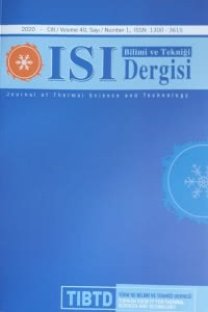EFFECTS OF AMBIENT CONDITIONS ON PERFORMANCE OF GAS TURBINE COGENERATION CYCLES
ÇEVRE ŞARTLARININ GAZ TURBİNLİ KOJENERASYON ÇEVRİMLERİNİN PERFORMANSI ÜZERİNE ETKİLERİ
___
- Al-Fahed, S.F., Alasfour, F.N., Abdulrahim, H.K., 2009, The Effect of Elevated Inlet Air Temperature and Relative Humidity on Cogeneration Systems, International Journal of Energy Research 33, 1384- 1394.
- Amel, A.A., and Cadavid, F.J., 2002 Influence of the Relative Humidity on The Air Cooling Thermal Load in Gas Turbine Power Plant, Applied Thermal Engineering, 22, 1529-1533.
- ASHRAE, 2000 Cogeneration systems and engine and turbine drives, ASHRAE Systems and Equipment Handbook (SI), Chapter 7, New York.
- Ashraf, M.B., 2001, Effects of Evaporative Inlet and Aftercooling on The Recuperated Gas Turbine cycle, Applied Thermal Engineering, 21, 1875-1890.
- Bejan, A., Tsatsaronis, G., Moran, M., 1996, Thermal Design and Optimization. Wiley Pub.
- Boyce, M.P., 2002, Handbook for Cogeneration and Combined Cycle Power Plants, ASME Press New York.
- Caresana, F., Pelagalli, L., Comodi, G., Renzi, M., 2014, Microturbogas Cogeneration Systems for Distributed Generation: Effects of Ambient Temperature on Global Performance and Components’ Behavior, Applied Energy, 124, 17-27.
- Horlock, J.H., 1997, Cogeneration-combined Heat and Power (CHP), CRİEGER Pub. Florida.
- Jaluria, Yogesh, 2008, Design and optimization of thermal systems, CRC Press.
- Karaali, R., 2010, Thermoeconomic Optimization of Cogeneration Power Plants, PhD Thesis, Kocaeli Univ., Turkey.
- Karaali, R., and Ozturk, I.T., 2015, Thermoeconomic Optimization of Gas Turbine Cogeneration Plants, Energy, 80, 474-485.
- Karaali, Rabi, and Öztürk, İlhan Tekin, 2015, Thermoeconomic Analyses of Steam Injected Gas Turbine Cogeneration Cycles, ACTA Physica Polonica A 128, No:2B, B279-B281
- Kehlhofet, R., Bachmann, R., Nielsen, H., Warner, J., 1999, Combined Cycle Gas Steam Turbine Power Plants, Penwell P.C.
- Khaliq, A., Kaushik, S.C., 2004, Thermodynamic Performance Evaluation of Combustion Gas Turbine Cogeneration System With Reheat, Applied Thermal Engineering, 24, 1785-1795.
- Kim, T.S., Song, C.H., Ro, S.T., Kauh, S.K., 2000, Influence of ambient condition on thermodynamic performance of the humid air turbine cycle. Energy, 25, 313-324.
- Mohapatra, A.K. and Sanjay, 2014, Thermodynamic Assessment of Impact of Inlet Air Cooling Techniques on Gas Turbine and Combined Cycle Performance, Energy, 68, 191-203.
- Moran, J.M., and Tsatsaronis, G., 2000, The CRC Handbook of Thermal Engineering, CRC Press LLC, 15-109.
- Najjar, Y.S.H., 2001, Efficient Use of Energy by Utilizing Gas Turbine Combined Systems, Applied Thermal Engineering, 21, 407-438.
- Pilavachi, P.A., 2000, Power Generation with Gas Turbine Systems and Combined Heat and Power, Applied Thermal Engineering, 20, 1421-1429.
- Santo, D.B.E., Gallo, W.L.R., 2000, Predicting Performance of a Gas Turbine Cogeneration System with Inlet Air Cooling, Ecos2000 Proceedings, Universiteit Twente, Nederland.
- Sue, D.C., Chuang, C.C., 2004, Engineering Design and Exergy Analyses for Combustion Gas Turbine Based Power Generation System, Energy, 29, 1183-1205.
- Wang, F.J., Chiou, JS., 2002, Performance Improvement for a Simple Cycle Gas Turbine GENSET- a Retrofitting Example, Applied Thermal Engineering, 22, 1105-1115.
- ISSN: 1300-3615
- Yayın Aralığı: 2
- Başlangıç: 1977
- Yayıncı: TÜRK ISI BİLİMİ VE TEKNİĞİ DERNEĞİ
Ertan BUYRUK, Gökhan GÜNHAN, Ahmet FERTELLI
ÇATALAĞZI TERMİK ELEKTRİK SANTRALİ İLE BÖLGESEL ISITMA YAPILABİLİRLİĞİN ENERJİ ANALİZİ
Halil İbrahim TOPAL, Mehmet KOPAÇ, Mustafa EYRİBOYUN
İKİ ZAMANLI TERS-DOĞRU AKIŞLI BENZİNLİ BİR MOTORUN YANMA ANALİZİ
Levent Ali KAVURMACIOGLU, Hidir MARAL, Cem Berk SENEL
Sinan ÇALIŞKAN, Mustafa KILIÇ, Tamer ÇALIŞIR, Şenol BAŞKAYA
EFFECTS OF AMBIENT CONDITIONS ON PERFORMANCE OF GAS TURBINE COGENERATION CYCLES
